De Duitse dichter en schrijver Markus Breidenich werd geboren in Düren op 18 mei 1972. Zie ook alle tags voor Markus Breidenich op dit blog.
Aber wahr ist
Aber wahr ist auch, dass es über den Bergen
leichter wird. Die Körnung der Wolken. Alles
unter den Hängen. Sieben Winde, die ziehen.
In meiner Form des Abendlichts spielen
Rottöne eine unbedeutende Rolle. Ich lese
in den Hochglanzspalten des Eises kein
leises Wort. Von der Hand in den Mond
leben heißt, seltsam sein, Staubkörner
sammeln für später. Der Weg, der hier oben
endlos ist, hat weder Höhen noch Tiefen.
Ich fahre über den Kraterrand. Daumenhoch
liegt Schnee neben dem Meer. Die Luft
über allem ist dünnhäutig. Blaustichig. Taub.
Wie die Westentasche meines Federkleids
kenne ich die Fluglinien der Sternschnuppen.
Unter den Siebenmeilenstiefeln meiner Erd-
uniform liegen Kalksteinplatten. Dem Morgengrau
hinterlasse ich meinen Breitengrad und die Uhrzeit.
WIE MAN DAS AUSHÄLT.
Dass man drinnen ist.
Und die Haut über den Dingen.
Wie man spätabends noch
auf den Bus wartet. Wenn es
sein könnte, dass er nicht kommt.
Dann zu Fuß geht. Dann
auf Händen. Kopfüber in
den Regen. In den Wald.
Wie das zugeht. Wie das
sein kann. Das mit den Augen.
Dass es immer so bleibt.
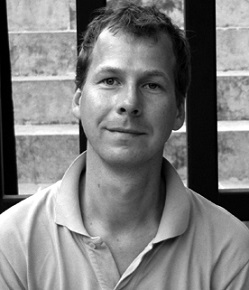
Markus Breidenich (Düren, 18 mei 1972)
De Duitse schrijver W.G. Sebald werd geboren in Wertach (Allgäu) op 18 mei 1944. Zie ook alle tags voor W. G. Sebald op dit blog.
Uit: Campo Santo (Vertaald door Anthea Bell)
“In September last year, during a two-week holiday on the island of Corsica, I took a blue bus one day down the west coast to Ajaccio to spend a little time looking around the town, of which I knew nothing except that it was the birthplace of the Emperor Napoleon. It was a beautiful, sunlit day, the branches of the palms in the Place Maréchal-Foch moved gently in a breeze coming in off the sea, a snow-white cruise ship lay in the harbor like a great iceberg, and I wandered through the streets feeling carefree and at ease, now and then going into one of the dark, tunnel-like entrances of buildings to read the names of their unknown inhabitants on the metal letter boxes with a certain rapt attention, trying to imagine what it would be like to live in one of these stone citadels, occupied to my life’s end solely with the study of time past and passing. But since we can none of us really live entirely withdrawn into ourselves, and must all have some more or less significant design in view, my wishful thinking about a few last years with no duties of any kind soon gave way to a need to fill the present afternoon somehow, and so I found myself, hardly knowing how I came there, in the entrance hall of the Musée Fesch, with notebook and pencil and a ticket in my hand.
Joseph Fesch, as I later read on looking him up in my old Guide Bleu, was the son of the late second marriage of Letizia Bonaparte’s mother to a Swiss military officer in Genoese service, and was thus Napoleon’s step-uncle. At the beginning of his career in the church he held a minor ecclesiastical position in Ajaccio. After his nephew had appointed him archbishop of Lyon and envoy to the Holy See, however, he became one of the most insatiable art collectors of his day, a time when the market was positively flooded with paintings and artifacts taken from churches, monasteries, and palaces during the French Revolution, bought from émigrés, and looted in the plundering of Dutch and Italian cities.”

W.G. Sebald (18 mei 1944 – 14 december 2001)
De Zuidkoreaanse schrijver Yi Mun-yol werd geboren op 18 mei 1948 in Yongyang. Zie ook alle tags voor Yi Mun-yol op dit blog.
Uit: An Anonymous Island (Vertaald door Heinz Insu Fenkl)
“Tsk-tsk.”
It’s the end of a long evening, and my husband clicks his tongue at the TV as if he were watching something despicable. On the screen there’s a group of men and women hunched in the corner of a police-station waiting room. The camera catches them from various angles, hiding their faces with their hands or with some article of clothing. I think they might have been arrested for gambling, but it seems they were dragged out in broad daylight from some dimly lit secret basement club where they were dancing. The announcer doesn’t say they were dancing—he uses a more suggestive phrase: “They were rubbing their bodies together.”
“What the hell is the matter with our generation?” my husband complains. “How did it get so easy to be anonymous?”
I’ve heard the same thing from him many times, and I can guess where he’s headed before he has even finished: Get off the bus one stop past your neighborhood in the city and you hardly recognize anyone. It’s so easy to hide these days—there must be huge numbers of people living anonymously. It’s the moral failing of our generation, a major factor in the corruption of women’s sexuality. He pushes on like that and eventually gets around to how much he misses his childhood home, a rural village with only one clan.
“We all knew each other,” he’ll say nostalgically. “It was like looking down into the water at your own reflection. . . . Most of the people were blood relations, so it was practically unthinkable for a woman to be unfaithful. Once in a while someone went off to a nearby village for that sort of thing, but sooner or later it was found out.
Whenever my husband goes on like this, it makes a repugnant memory resurface in my mind and I feel sorry for him. Maybe I should feel some shame for myself, too, but it’s something that happened ten long years ago.”
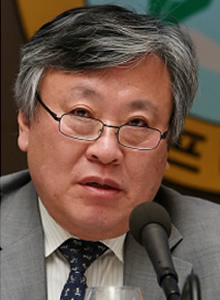
Yi Mun-yol (Yongyang, 18 mei 1948)
De Franse schrijver François Nourissier werd geboren op 18 mei 1927 in Parijs. Zie ook alle tags voor François Nourissier op dit blog.
Uit: Le gardien des ruines
« Fargeau, pour n’être pas pris à partie (et au risque de l’être davantage), a déclaré qu’il était médecin. Peut-être même a-t-il marmonné le mot « urgence ». On a haussé les épaules et jeté des coups d’oeil sur le caducée collé au pare-brise. Il s’est redressé, a fait deux pas et rangé la voiture un peu plus loin, sous les regards. Allait-il fuir ? Un toubib ! On ne sait jamais. On soutenait la victime. Une Viet, évidemment… Un commerçant a traversé le parfum chaud de poulets en train de griller à la broche et il a distribué les rôles :— C’est le docteur installé plus loin sur le même trottoir, ma mère le connaît. Elle, la petite vieille, c’est la congaï de la rue Daumier…
Maintenant, Fargeau aide « la petite vieille » à monter deux étages d’un escalier de ciment gris. Elle n’a toujours pas ouvert la bouche et c’est par gestes qu’elle l’a guidé jusqu’à sa maison, à deux minutes du lieu de l’accident. Elle a ri, les yeux fermés, quand quelqu’un a parlé d’appeler le Samu, d’un drôle de rire édenté, noirâtre. Sa clé, accrochée par une ficelle autour de son cou, est enfoncée dans une poche invisible. Ouverte, la porte révèle une seule pièce, trois mètres sur quatre, dont un lit mange le tiers, les murs couverts de penderies en plastique, de rayonnages et de rideaux, partout, qui cachent des choses.— Je suis la veuve Alessandri, dit-elle d’une voix de crécelle jaune, et elle tend le doigt. Elle désigne une vingtaine de photographies encadrées sur un rayon : on y voit un beau brun des années cinquante en kaki, torse nu, en képi blanc, en chapeau de brousse, en short, en tenue léopard, cigarette à la bouche, rieur, avantageux, immortel.— Adjudant-chef Alessandri, dit-elle.Elle se tient comme au garde-à-vous, immobile, minuscule, ensachée dans des couches de vêtements indéfinissables. Elle paraît cent ans. La chambre est sombre, d’une propreté parfaite sur laquelle flotte un parfum vaguement salé. Ses yeux s’habituant à la pénombre, Fargeau devine des objets militaires, une croix de guerre, un bout de ruban tricolore, du crêpe noir, une bougie éteinte, une cigale provençale, un râtelier de pipes, et partout de la pacotille multicolore, des chinoiseries. »
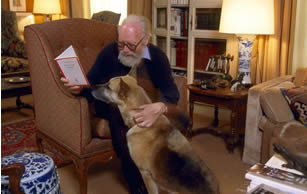
François Nourissier (18 mei 1927 – 15 februari 2011)
In 1994
De IJslandse dichter en schrijver Gunnar Gunnarsson werd geboren op 18 mei 1889 in Fljótsdalur. Zie ook alle tags voor Gunnar Gunnarsson op dit blog.
Uit: Father And Son (Vertaald door Peter Foote)
“For the time being his body was laid on a flat boulder in the shelter of a shallow cave in the cliffside nearby—later they would bring a sledge to fetch him into the village. For a long time little Snjolfur stood by old Snjolfur and stroked his white hair; he murmured something as he did it, but no one heard what he said. But he did not cry and he showed no dismay. The men with the snow- shovels agreed that he was a strange lad, with not a tear for his father’s death, and they were half-inclined to dislike him for it.— He’s a hard one! they said, but not in admiration.—You can carry things too far.
It was perhaps because of this that no one paid any further attention to little Snjolfur. When the rescue-party and the people who had come out of mere curiosity made their way back for a bite of breakfast and a sledge for the body, the boy was left alone on the Point.
The snow-slip had shifted the cabin and it was all twisted and smashed; posts missing their laths stuck up out of the snow, tools and household gear were visible here and there—when he laid hold of them, they were as if bonded the snow. Snjolfur wandered down to the shore with the idea of seeing what had become of the boat. When he saw with what cold glee the waves were playing with its shattered fragments amongst the lumpy masses of snow below highwatermark, his frown deepened, but he did not say anything.”
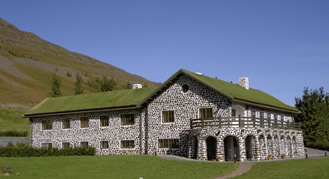
Gunnar Gunnarsson (18 mei 1889 – 21 november 1975)
Skriðuklaustur – het voormalige huis van Gunnar Gunnarsson, nu museum
De Perzische dichter Omar Khayyám, of zoals zijn arabische naam luidt, al-Imâm Abu Hafs ‘Omar ebn Ebrâhim al-Khayyâmi, werd geboren op 18 mei 1048 te Nishapur. Zie ook alle tags voor Omar Khayyám op dit blog.
Kwatrijnen
O, wilde God zóó onze wegen leiden,
Dat wij op één plek rustten met ons beiden,
Om ons na honderdduizend jaren weer
Opnieuw te scheppen als de lenteweiden.
Behaalt gij roem, gij zult eerzuchtig heeten.
Stil werkt ge? als woeler wordt gij uitgekreten.
Wie gij ook zijt, en wat gij doet, dit ’s ’t beste:
Gij kent geen mensch, en elk heeft u vergeten.
Werd mij dit toegestaan te zijn ontwrongen
Aan wereld en dit lot, mij opgedrongen.
O, was ik nooit ontstaan, nooit hier geweest,
Dan werd ik nimmer tot vertrek gedwongen.
Geen middel baat, niets brengt me U naderbij,
Niets rekt den afstand tusschen U en mij.
Me ontbreekt de moed ziels nooden uit te staamlen.
O wondre smart, o zoet leed, dat ik lij’.
Vertaald door Willem de Mérode
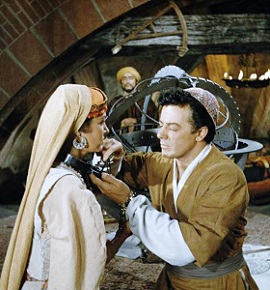
Omar Khayyam (18 mei 1048 – 4 december 1131)
Debra Paget (Sharain) en Cornel Wilde (Khayyam) in de film “The Life, Loves and Adventures of Omar Khayyam” uit 1957
De Duitse dichter en schrijver Ernst Wiechert werd geboren op 18 mei 1887 in Kleinort bij Sensburg in Oostpruisen.(Tegenwoordig Polen). Zie ook alle tags voor Ernst Wiechert op dit blog.
Uit: Jahre und Zeiten. Erinnerungen14
“Der Roman hieß Der Buchenhügel, und er hatte ihn begonnen, als er Frenssens “Jörn Uhl” gelesen hatte. Es hatte ihm geschienen, als könnte dieses Buch viel besser geschrieben werden, und eben damit war er beschäftigt.
Vierzig Jahre später nun, um die gleiche Zeit und die gleiche Stunde, sitze ich auf der Altane über dem Garten und beginne, an diesen Blättern zu schreiben. Die Sonne geht gerade auf und wirft ein rötliches Licht auf die Zweige der Apfelbäume, die über das Geländer hängen und mit einer verwirrenden Fülle von Blüten überschüttet sind. Der Kuckuck ruft wie damals aus dem nahen Walde, und das Gebirge liegt blau und großartig am Saume der schweigenden Welt. Die heilige Frühe steht über der Erde wie damals, aber es sind keine Fischer da, die Reiher fliegen nicht nach einem großen Wasser, und auch der Unsterblichkeit ist der Schreibende nicht mehr ganz so gewiß. Ja, er denkt mit einem stillen Lächeln an dieses große Wort, und wenn er einen Blick auf das Manuskript jenes ersten Romans wirft, das neben ihm liegt, auf die große, deutliche, kindliche Handschrift eines schlafwandlerisch Beginnenden, und den Blick von dort zurückwendet auf die winzige, kaum leserliche Schrift dieser Blätter, die er nun beginnt, ermißt er schon daran, wie Jahre und Jahrzehnte dahingegangen sind. Die Zeit, die große schweigende Zeit, die über Handschrift und Pläne schweigend hingegangen ist. Das Wandelnde, das Verändernde, das still Begrabende und still wieder Aussäende. Und er streift mit der linken Hand leise über den Apfelblüten-Ast und meint, daß alles Notwendige wohl gut und in der guten Ordnung sei.
Wozu schreibt einer sein Leben auf, wenn es nun langsam zur stillen Neige geht? Die Narren schreiben ihre Weisheit auf und die Weisen ihre Irrtümer.“
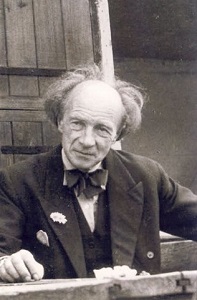
Ernst Wiechert (18 mei 1887 – 24 augustus 1950)
In 1949
Zie voor nog meer schrijvers van de 18e mei ook mijn blog van 18 mei 2014 deel 2.
